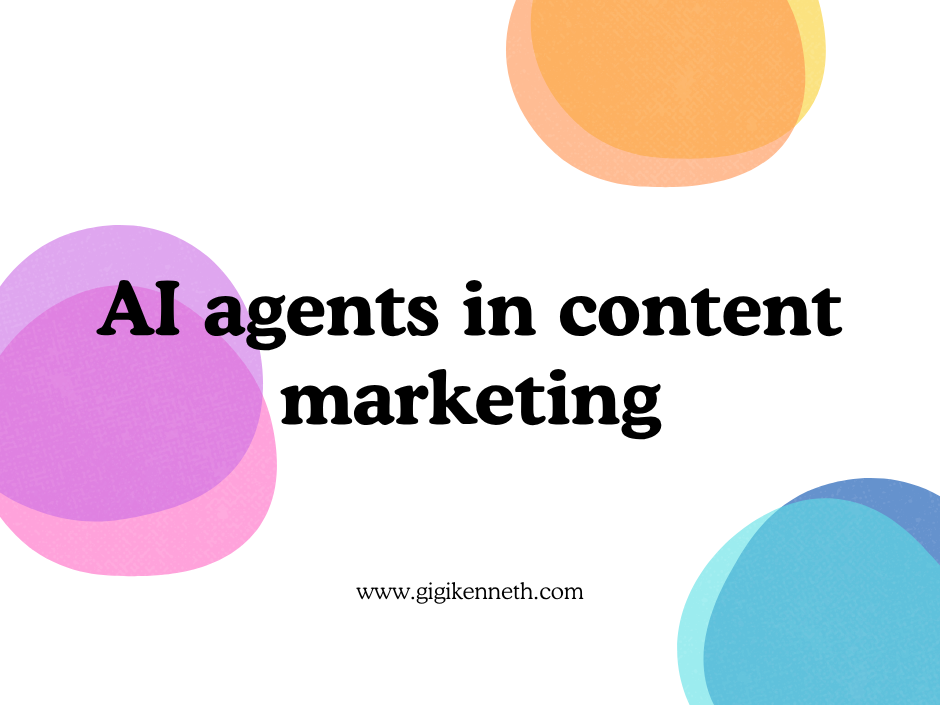What Are AI Agents in Content Marketing?
- Gigi Kenneth
- Aug 2, 2025
- 4 min read

You’ve probably seen headlines about “AI agents revolutionizing marketing” or “autonomous agents that run your content.” But let’s pause for a second, what is an AI agent, really? And what does it look like in content marketing today?
In this post, I’ll explain the basics and share how AI agents are already being used by marketers.
First, What Is an AI Agent?
An AI agent is a system that can make decisions and complete tasks based on a set goal. Instead of just following fixed instructions like traditional automation, it reacts to inputs, adapts its actions, and even decides what to do next.
Think of it as a virtual teammate, not just a tool.
Automation is like: “If a new blog is published, send an email.”
An AI agent is like: “Read this blog, write a social post summary, design an image for Instagram, then schedule it for the best time.”
AI agents rely on large language models (LLMs) like OpenAI’s GPT-4, Anthropic’s Claude, and platforms like LangChain or Relevance AI, which allow you to chain tasks together and build more autonomous behavior.
Some resources:
Why Are AI Agents Showing Up in Marketing Now?
A few big shifts made this moment possible:
Cheaper access to AI models – You no longer need a massive budget to experiment.
Better infrastructure for chaining actions – Thanks to tools like LangChain and Make, AI agents can do more than just answer prompts.
More AI-native startups – Companies like Relevance AI and Jasper are building tools specifically designed for content marketing agents.
Check out: NoGood: Top AI Agents for Marketers in 2025
In short, we’re moving from single-use tools (like an AI writing assistant) to multi-step systems that handle research, writing, scheduling, and performance analysis autonomously.
How AI Agents Are Used in Content Marketing
Here’s a simple breakdown of how AI agents show up in modern content teams:
Task | What the Agent Does |
Topic Research | Scans competitor blogs, extracts trends, suggests titles |
Brief Creation | Writes SEO-friendly outlines and structure for writers |
Writing | Produces blog drafts, newsletters, captions, and ad copy |
Editing | Improves grammar, tone, clarity, and SEO keywords |
Repurposing | Converts a blog into LinkedIn posts, Instagram carousels, threads |
Design Support | Creates image concepts for Canva or MagicStudio |
Scheduling | Publishes content to social tools like Buffer or Hypefury |
QA & Analysis | Flags outdated content, suggests performance improvements |
You can see how this turns a messy content process into something that (mostly) runs itself.
A Quick Example: From Podcast to Posts
Let’s say you record a weekly podcast episode. Here’s what an AI agent can do with it:
Transcribe the episode using Whisper or Descript
Summarize the key takeaways for a blog post
Write 3 social posts: one for LinkedIn, one for Twitter, one for Instagram
Create carousel designs using a Canva plugin
Schedule everything across platforms
Track clicks and engagement, and suggest changes for next time
The best part about this is that you show up to record. The agent handles the rest.
If you’re curious about this setup, I'll be sharing my experiments with a couple of tools in the next few weeks. Be on the lookout for my next blog posts on this topic!
What AI Agents Are Not
Alrighty, let’s be clear on something: AI agents aren’t magical. There are still limits:
They still need your voice: Without training or good prompting, the output can be bland or generic.
They make mistakes: Especially with dates, citations, or tone.
They’re not replacements: The best results come from collaboration, not delegation.
Think of agents as your smart intern (or as Allie K. Miller likes to describe them, an owl that sits on your shoulder), they’ll do 80% of the work fast, but you’ll want to review, refine, and guide them.
Final Thoughts on AI Agents in Content Marketing
AI agents are quietly transforming how content (and a lot of things, to be honest) gets made, but not by replacing creativity.
They handle the repetitive, heavy stuff so you can focus on what actually matters: ideas, connection, and strategy.
If you’re running a small content team (or are a solo marketer or founder), now is the best time to explore how agents can support your workflow. I'll be covering more on this in future blog posts as well.
In my next post, I’ll show you how I built a no-code AI content agent that runs parts of this blog, including all the tools I used, the prompts that worked, and what I’d do differently.
Want updates? Subscribe to my mailing list. Or follow me on LinkedIn
❓Frequently Asked Questions
1. What is an AI agent in content marketing?
An AI agent in content marketing is a system that performs tasks like research, writing, editing, or distribution based on goals you define. Unlike traditional automation, AI agents adapt and make decisions using large language models and dynamic input.
2. How are AI agents different from automation tools?
Automation tools follow fixed instructions (like “send email when blog is published”). AI agents go further—they analyze context, generate content, adapt to changing data, and complete multi-step processes with minimal input.
3. Can AI agents create blog posts or social content on their own?
Yes. Many AI agents can write full blog drafts, generate social posts, and even design image templates. However, the quality improves significantly with human review and editing.
4. Do I need coding skills to use AI agents?
Not necessarily. Tools like Make, Zapier, and Relevance AI let you build no-code or low-code AI agent systems. These platforms are beginner-friendly and customizable.


Comments